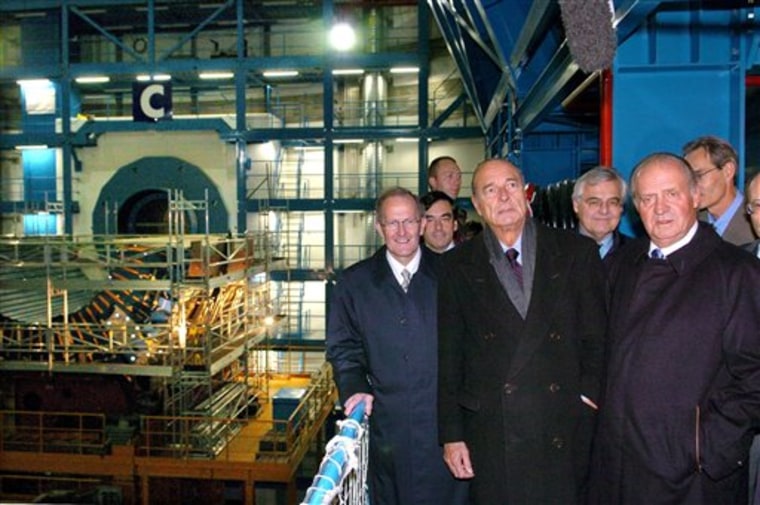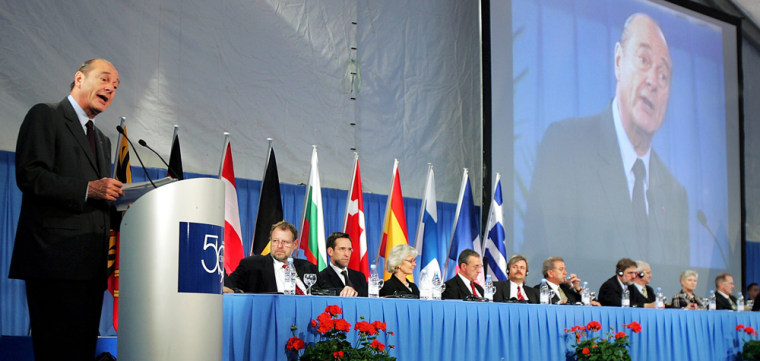As European scientists celebrated the 50th birthday of the lab where they made discoveries about the origins of the universe and gave birth to the World Wide Web, French President Jacques Chirac told them they could do more.
For half a century, the European Organization for Nuclear Research, known by the French initials CERN, has been the world's largest atom-smashing laboratory, hosting world research and experiments into the consistency of matter. It helped to stem a brain drain from postwar Europe to the United States.
But "in terms of Nobel prizes, publications, patents and science students, Europe is losing ground at an alarming rate," Chirac said during Tuesday's 50th-anniversary ceremonies.
"It no longer comes from the major powers in the developed world, such as the United States or Japan," he said. "Each passing day sees more competition from the large emerging countries, like India and China."
About 6,500 scientists from 80 countries — half the world's researchers specializing in particle physics — work at CERN, Chirac noted.
The lab's 20 European member countries and other observer states make contributions to pay its yearly budget of about 1 billion Swiss francs ($800 million).
Chirac noted the European Union plans to be spending 3 percent of its wealth on research by 2010, but said more was needed.
'Center of excellence'
Spanish King Juan Carlos, another featured speaker at the CERN birthday celebration, lauded the lab for helping Europe regain the position it held earlier in the 20th century as home to leading scientists such as Albert Einstein.
"CERN is certainly the leading particle physics laboratory in the world, a center of excellence that attracts world experts in the field," the king said.
Others noted the strong U.S. support in the founding CERN to help reunite Europe after World War II.
"The idea for CERN can be traced back to two American scientists — Robert Oppenheimer and Nobel laureate Isidore Rabi," said Francois de Rose, the only survivor from the dozen founding scientists.
After the U.S. Congress pulled the plug on the construction in Texas of the proposed Superconducting Super Collider in 1993, CERN became a focus for world research into matter and into understanding the origins of the universe.
Highlights in history
Highlights in CERN's history have included the 1984 Nobel physics prize going to Carlo Rubbia and Simon van der Meer for their discovery of two particles, the W boson and Z boson. The same prize in 1992 went to Georges Charpak of CERN, for his invention of the "multiwire proportional chamber," which revolutionized the tracking of particles and is used in many medical applications.
In 1990, British scientist Tim Berners-Lee was working at CERN when he proposed a way to help researchers by linking related pieces of information across the Internet in what became the World Wide Web.

Recently, however, research has been reduced as CERN replaces the largest collider in its 17-mile (27-kilometer) circular tunnel, big enough for a subway train and located under the Swiss-French border.
The $1.8 billion Large Hadron Collider, which has underground detectors the size of cathedrals, should be installed by 2007, and "will allow physicists to complete a journey that started with Newton's description of gravity," CERN said in a statement.
"Gravity acts on mass, but so far science is unable to explain why the fundamental particles have the masses they have," it said.
With the new machine, scientists will also help investigate "the mysterious missing mass and 'dark' energy of the universe — visible matter seems to account for just 5 percent of what must exist.
"They will investigate the reason for nature's preference for matter over antimatter, and they will probe matter as it existed at the very beginning of time," CERN said.
The CERN member states are Austria, Belgium, Britain, Bulgaria, the Czech Republic, Denmark, Finland, France, Germany, Greece, Hungary, Italy, the Netherlands, Norway, Poland, Portugal, Slovakia, Spain, Sweden and Switzerland.
Observer nations whose physicists work at CERN include India, Israel, Japan, Russia and Turkey. Scientists from the United States are also among those who take turns conducting experiments with the particle accelerators.
"The scale of the experiments we perform is so huge that no one institute or even country can conduct them alone," said Richard Webb, a 25-year-old British scientist at CERN.
